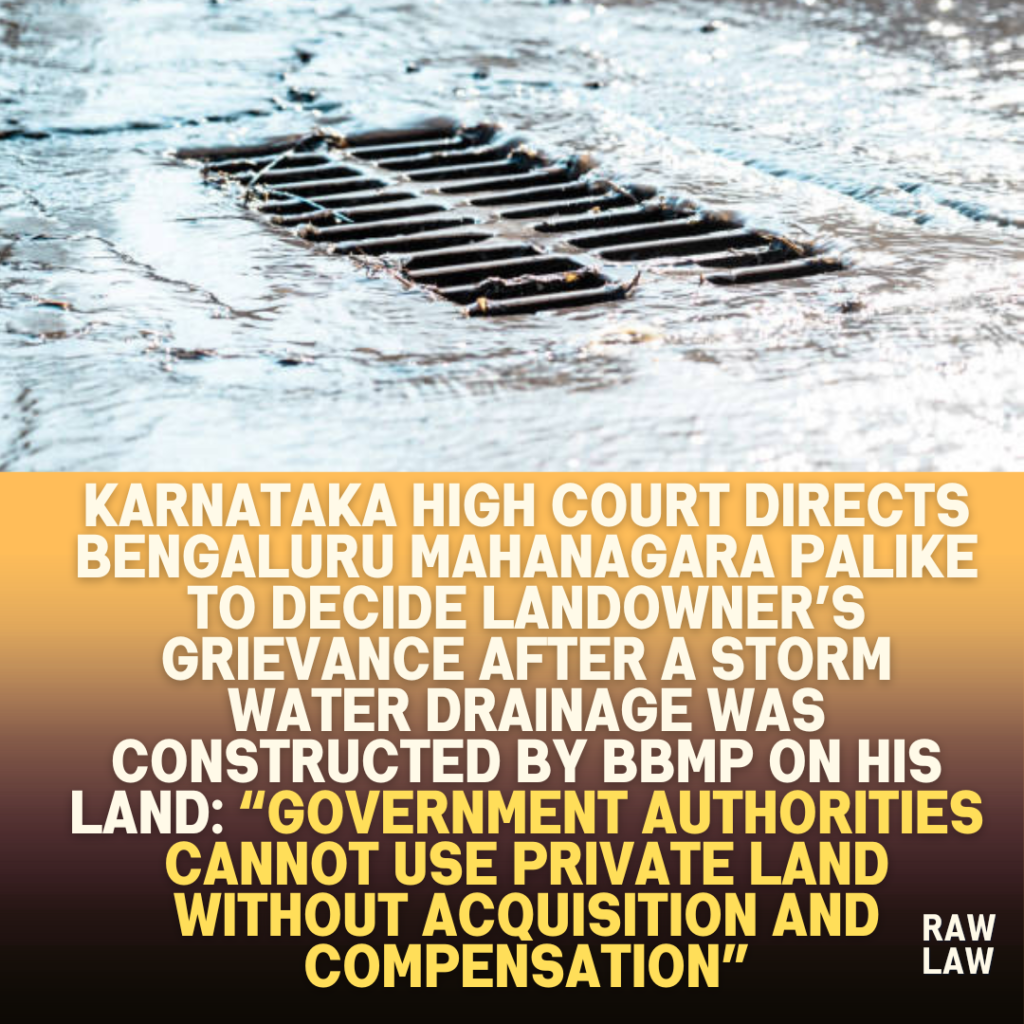Court’s Decision
The Karnataka High Court allowed the writ petition and directed the Commissioner of the Bruhat Bengaluru Mahanagara Palike (BBMP) to consider the petitioner’s legal notice dated 10.11.2023 and representation dated 19.01.2024 and pass appropriate orders within two months. The Court emphasized that in case it is found that the petitioner’s land was used for drainage purposes, the BBMP would be obliged to compensate him in accordance with law.
Facts
The petitioner, claiming to be the absolute owner in possession of agricultural lands bearing Survey Nos. 5/1 and 5/2 at Nagasandra village, Yeshwanthapura Hobli, Bengaluru North Taluk, approached the Court after a storm water drainage (SWD) was constructed by BBMP on his land. The petitioner alleged that this was done without following due process of law, i.e., without initiating acquisition proceedings or compensating him.
Despite serving a legal notice dated 10.11.2023 and submitting a representation on 19.01.2024, the authorities had not responded, compelling the petitioner to seek a writ of mandamus.
Issues
- Whether the BBMP had acted illegally by constructing the drainage on the petitioner’s land without acquisition or consent.
- Whether the non-consideration of the petitioner’s legal notice and representation constituted administrative arbitrariness and required judicial intervention.
Petitioner’s Arguments
The petitioner contended that he is the absolute owner of the land and is in peaceful possession of it. He alleged that a portion of his land was used by the BBMP to construct a drainage line without initiating any legal process of acquisition. A private engineer’s sketch was submitted to support his claim that portions of Survey Nos. 5/1 and 5/2 were encroached for the SWD. Despite repeated communications—through a legal notice and representation—the BBMP failed to respond or clarify its stand, thereby violating his constitutional right to property.
Respondent’s Arguments
The standing counsel for the BBMP, upon receiving instructions, assured the Court that the petitioner’s representation dated 19.01.2024 would be considered and an appropriate decision would be taken as per law. No stand was taken either admitting or denying the use of the petitioner’s land for drainage purposes.
Analysis of the Law
The Court emphasized that while the right to property is no longer a fundamental right, it remains a constitutional right under Article 300A of the Constitution. Any action by the State or its instrumentalities that results in deprivation of property must follow the due process of law, including acquisition under the relevant statutes such as the Land Acquisition Act or Karnataka Land Reforms Act.
The Court noted that numerous judgments have affirmed that governmental authorities cannot utilize private land without acquiring it and compensating the landowner, and that failure to consider representations in such cases amounts to administrative indifference.
Precedent Analysis
While no specific precedent names are cited in the order, the Court referred to its consistent jurisprudence on the right to property being a constitutional right and the need for the State to follow due process in acquiring private land. The reference reaffirms the judicial trend of protecting property rights despite the removal of Article 31 from the Constitution.
Court’s Reasoning
The Court found merit in the petitioner’s grievance. It held that:
“There is complete laxness on the part of respondent No.1 and his officials in not responding to the legal notice dated 10.11.2023 and to the representation dated 19.01.2024.”
It further noted that:
“The respondents have not taken a stand either disputing or admitting the formation of the drainage in the petition lands.”
Given the existence of the sketch and the absence of a rebuttal from the BBMP, the Court held that the BBMP is duty-bound to respond and take appropriate action.
Conclusion
The writ petition was allowed with the following directions:
- Respondent No.1 (BBMP Commissioner) is directed to consider the legal notice dated 10.11.2023 and representation dated 19.01.2024.
- Appropriate orders must be passed in accordance with law.
- The entire exercise must be completed within two months from the date of receipt of the court order.
Implications
This judgment reinforces the principle that administrative authorities cannot act arbitrarily in matters involving private property. The High Court’s recognition of the constitutional right to property and its insistence on due process serves as a strong reminder to State authorities that failure to respond to grievances—particularly those involving potential unlawful deprivation of property—will not be condoned by constitutional courts.
The case could pave the way for similarly affected landowners to seek remedies through writ petitions when faced with illegal encroachments or unauthorized governmental constructions on private land.
Also Read: Calcutta High Court Quashes Cheating Case Against Land Buyer
